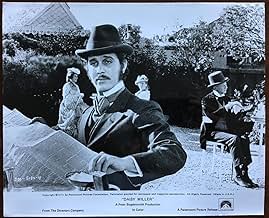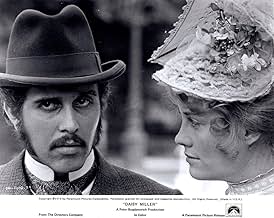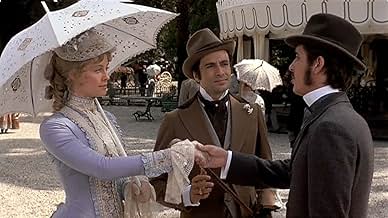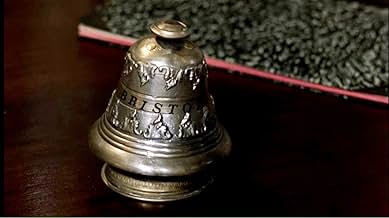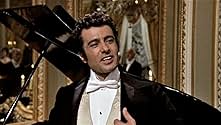In dieser Sittenkomödie versucht Frederick Winterbourne, die fröhliche und temperamentvolle Daisy Miller zu ergründen, nur um sich von falschen Urteilen ihrer Mitstreiter helfen und behinder... Alles lesenIn dieser Sittenkomödie versucht Frederick Winterbourne, die fröhliche und temperamentvolle Daisy Miller zu ergründen, nur um sich von falschen Urteilen ihrer Mitstreiter helfen und behindern zu lassen.In dieser Sittenkomödie versucht Frederick Winterbourne, die fröhliche und temperamentvolle Daisy Miller zu ergründen, nur um sich von falschen Urteilen ihrer Mitstreiter helfen und behindern zu lassen.
- Regie
- Drehbuch
- Hauptbesetzung
- Für 1 Oscar nominiert
- 1 Gewinn & 1 Nominierung insgesamt
Empfohlene Bewertungen
Yes, Daisy in the film is rather flat and monotonous. But that's a high compliment -- that the ravishing Cybill Shepherd could so accurately portray such a flat character. Henry James at one point describes Daisy's expression as a "light, slightly monotonous smile", in another her voice as a "little soft, flat monotone". He says late in the story that "there was always, in her conversation, the same odd mixture of audacity and puerility". No, she wouldn't be a very pleasant person to be around for long. But that was part of James's point: that our attraction to people (especially those of the opposite sex) often defies reason. Shepard makes the point well.
Some have commented that they wished the story had been filled out. Some of those apparently haven't read the story. One of those critics even places the story wrong by forty years. Though called a novella, it's barely more than a short story. In fact the film does a remarkable job of portraying the events and (more importantly) the characters very much as they are in the story. The great majority of the dialog in the film is verbatim from the story.
In some instances, the scenes and characters were significantly expanded from the James story. How far should a director go, if the aim is to film a classic story, not just to make something derived from that story? James's characters were pretty flat, a lot flatter than those in the film. One could justifiably criticize the film for telling the story far better than James did.
Do you think James's story is dated and flat in the modern world? Well, in many ways so do I. A polemical assault on discrimination based on manners and birth is truly dated. Yet an assault on personal discrimination remains fully current. The modern world is certainly not devoid of personal discrimination. Perhaps it's not often so ugly, not in the first world anyway, but prejudice is very much alive.
James's story is also unsubtle: two groups of people with differing views, one person caught with one foot in each camp, unhappy results. That's about it. Should one film the classic story, or build something different? It's a choice; great films have been made both ways. The choice for this film was unambiguous: to film the classic story.
The photography is truly gorgeous -- the film (at least the outdoor parts) was shot on location in Vevey, Switzerland and Rome, Italy. Despite the long stretches of dialog, including Daisy's run-on commentaries, one need not strain to understand the words. If the story were as good as the production and acting (several good performances) then this would be a 10. The faithfulness to the original weights it down.
It's irresistible to consider the parallels between real life and reel life: The young Bogdonavich dotes on his leading lady as blindly as Barry Brown's character dotes on Daisy. But the poignancy is tempered somewhat when you consider that this nattering, uninteresting young lady would be absolute hell to live with.
Produced & directed by Peter Bogdanovich, this so-so film certainly *looks* great, with excellent set & costume design and use of locations. But it never really takes an emotional hold, at least not on this viewer. The cast, in general, is good: also appearing are the amiable Duilio Del Prete as the gregarious Mr. Giovanelli, Eileen Brennan as the disapproving Mrs. Walker, Mildred Natwick as Fredericks' similarly conservative aunt Mrs. Costello, and George Morfogen as the manservant Eugenio. Brown does a fine job in his co-starring role, but this adaptation can't overcome the miscasting of Shepherd. She's able to get out reams of dialogue in a breathless manner, shows some charm, and sings quite nicely, but she's simply not a good fit for this sort of setting or material.
The material does have potential as a portrait of irreverence and individuality in a time of strict manners and morals, but overall it doesn't quite hit the mark, despite the best efforts of the crew and supporting cast.
Six out of 10.
Wusstest du schon
- WissenswertesAccording to Peter Bogdanovich, Hollywood legend Orson Welles said that actress Cybill Shepherd was born to play Daisy Miller, but he didn't want to direct Daisy Miller (1974).
- Zitate
Annie P. 'Daisy' Miller: I'm a terrible, frightful flirt. Did you ever hear of a nice girl that wasn't? But now I guess you'll tell me I'm not a nice girl.
- VerbindungenFeatured in Daisy Miller: An Introduction by Peter Bogdanovich (2003)
Top-Auswahl
- How long is Daisy Miller?Powered by Alexa
Details
Box Office
- Budget
- 2.200.000 $ (geschätzt)



